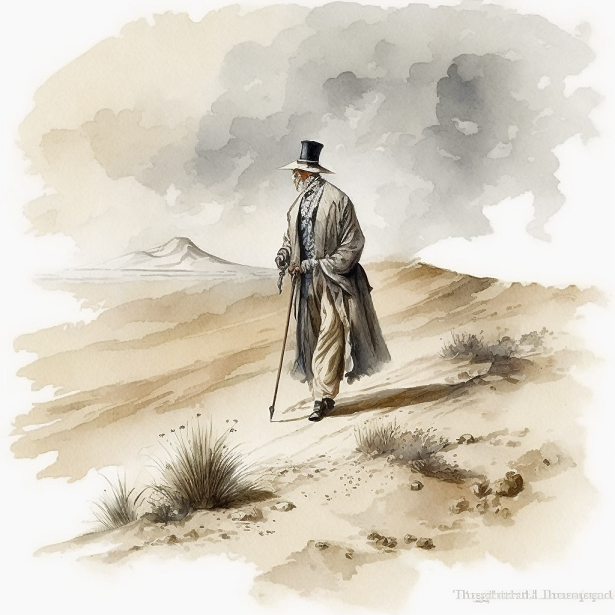Within the pages of history, the life of Charles Montagu Doughty stands as a captivating narrative of an extraordinary man. In this article, we embark on a journey through the remarkable existence of Doughty, a figure whose story is as intricate and unique as the landscapes he explored during his lifetime. From his early years to his monumental literary contributions, we delve into the multifaceted facets of Doughty’s life, unearthing a portrait of a man whose legacy remains as distinctive as his persona. Join us in discovering the captivating tale of Charles Montagu Doughty, an enigmatic individual whose fame continues to resonate through time.
Formative Years and Disappointments
Doughty’s journey begins within the cradle of aristocracy and conservatism. Raised amidst the lofty traditions of his mother’s family, the Hothams, he was groomed for a career in the Royal Navy. The aura of privilege and the values of the aristocracy instilled in him a set of expectations and ambitions that would profoundly influence his path.
Naval Ambitions and Rejection
Despite his aristocratic upbringing and naval aspirations, young Doughty faced a pivotal setback in 1856 when his dreams of a naval career were shattered. Rejected for service due to a slight impediment in his speech, this rejection would leave an indelible mark on him. The disappointment of being denied a role in the Royal Navy in 1856 would linger, even to the extent that he envied a wartime title of Temporary Commander in 1919.
Academic Journey at Cambridge
Unbowed by his naval rejection, Doughty charted a new course through academia. Matriculating at Caius College, Cambridge, in October 1861, he embarked on a journey of higher learning. However, his experiences in academia would be characterised by shyness, nervousness, and an initial lack of literary inclinations. This section explores his academic pursuits, highlighting his struggles and challenges as he pursued knowledge and self-discovery.
Doughty’s early years and disappointments laid the groundwork for the intriguing and enigmatic personality that would shape the rest of his life. His aristocratic upbringing, naval ambitions, and academic journey at Cambridge set the stage for the extraordinary adventures and literary contributions that would come to define him.
The Unyielding Quest: Doughty’s Explorations
After facing the disappointment of a rejected naval career and completing his academic journey at Cambridge, Doughty entered a phase of wandering and exploration. This period of his life was characterised by a relentless urge to explore the unknown. He left behind the confines of traditional expectations and ventured into the wider world.
The Ambition to Visit Medain Salih
Amidst his wandering, Doughty’s ambition crystallised around the prospect of visiting Medain Salih. The allure of this destination held a unique fascination for him, sparking the flame of his unyielding quest. We explore the reasons behind his desire to reach Medain Salih and the significance of this goal in his life’s journey.
Initial Rejections and Setbacks
In his relentless pursuit of visiting Medain Saleh, Charles Montagu Doughty encountered initial rejections and hurdles. His ambitious journey was contingent on securing both financial support and a firman (royal permission) to venture to Medain Saleh. One of his initial setbacks revolved around his application for a grant from the British Association. However, this process proved to be a challenge as the British Association only met once a year to make grant decisions. Moreover, his request for a firman from the Sultan was met with complexities, as it would have required diplomatic efforts through the Foreign Office. These obstacles underscored the formidable barriers that Doughty had to overcome as he navigated the early stages of his quest to explore Medain Saleh.
A Daring Departure for the Haj
Doughty’s departure for the Haj unfolded as an extraordinary and innovative adventure. While most pilgrims embarked on this journey driven by religious devotion, Doughty’s motives were rooted in an insatiable thirst for exploration and the thrill of the unknown. His approach to undertaking the Haj was a departure from the conventional, and it entailed navigating a complex web of surveillance and stringent restrictions.
During the era in which he embarked on this remarkable journey, pilgrimages to the holy sites were tightly regulated, with admission of non-muslims strictly forbidden, making it essential for Doughty to employ cunning strategies to elude prying eyes. To achieve this, he adopted a striking disguise, taking on the persona of a humble Syrian with limited means. This transformation allowed him to seamlessly blend into the environment, presenting himself as an unassuming traveller amidst the backdrop of a bustling and scrutinising world. Doughty’s ability to immerse himself in this new identity was a testament to his resourcefulness and determination, enabling him to navigate the intricacies of this remarkable adventure.
The Uniqueness and Quality of ‘Arabia Deserta’
‘Arabia Deserta,’ Charles Montagu Doughty’s literary masterpiece born from his intrepid wanderings, stands as a work of unparalleled uniqueness. Its 600,000 words provide a captivating and in-depth exploration of the Arabian deserts, which few had dared to undertake. Doughty’s distinct style, marked by the eloquence of the Victorian era and an intricate use of language, posed challenges to contemporary readers. However, this very uniqueness drew a select group of enthusiasts who appreciated his literary artistry.
In ‘Arabia Deserta,’ Doughty’s deep insights into the landscapes, cultures, and histories of the Arabian deserts captivated readers with a thirst for authentic exploration narratives. He spared no detail in describing the arid landscapes, the nomadic tribes he encountered, and the ancient ruins that whispered stories of a bygone era. Doughty’s writings evoked a vivid sense of place and culture, immersing readers in the harsh yet enchanting world of the Arabian deserts.
In the world of exploration and literature, ‘Arabia Deserta’ remains a beacon of Doughty’s unwavering passion, dedication, and his truly unique voice. Dr. Hogarth’s dedicated efforts to unearth the hidden narrative within Doughty’s diaries and notebooks add depth and dimension to the legacy of this extraordinary adventurer and writer. This literary opus continues to inspire and enthral those who seek the extraordinary in the realm of travel literature.
The Enigma of Doughty’s Personality
Doughty’s return to London was marked by a personality that remained an enigma to many. His experiences and adventures had moulded him into a unique individual, and he was often seen as out of touch with contemporary events. This part of our journey peels back the layers of Doughty’s complex personality, shedding light on the idiosyncrasies that both intrigued and confounded those around him.
Doughty’s interactions with scientific societies, particularly the Royal Geographical Society, revealed a strained relationship. He felt that his contributions were underappreciated and often faced disappointments in his efforts to engage with these organisations.
The Odyssey of Publishing ‘Arabia Deserta’
The publication journey of ‘Arabia Deserta’ was a true odyssey, rife with trials and tribulations. Doughty’s extensive manuscript embarked on a treacherous voyage through the unpredictable realm of publishing. When he chose the Cambridge University Press as the custodian of his work, he unwittingly embarked on a path fraught with complications. The relationship between author and publisher became a labyrinth of challenges and misunderstandings.
Doughty faced a multitude of difficulties during the publication process. His unique writing style, reminiscent of a bygone era, required extensive revisions to conform to contemporary publishing standards. This demanded painstaking efforts and revisions that tested his patience and the tolerance of the publishing house. Additionally, the financial liabilities that arose from these revisions added yet another layer of complexity to the already intricate partnership. Doughty’s determination to see his work in print was admirable, but it came at a price – a price that encompassed not only financial burden but also the endurance of numerous obstacles in his quest to share ‘Arabia Deserta’ with the world.
Charles Montagu Doughty emerges as a figure of profound complexity, his personality a tapestry of enigmatic traits. His early disappointments, unyielding determination, and unconventional pursuits shaped a character that confounded and fascinated those who crossed his path. In this concluding part, we revisit the layers of his complicated temperament, seeking to understand the forces that drove him to his audacious adventures.
Despite the challenges and setbacks, Doughty’s greatest contribution to the world was ‘Arabia Deserta.’ This monumental work, initially seen as lengthy and obscure, has since garnered the recognition it deserves. Late appreciation, fueled by the unique insights it offers into the Arabian deserts and the regions he explored, stands as a testament to the enduring value of his literary masterpiece.
Doughty’s Legacy and the Award of the Founder’s Medal (1912)
Charles Montagu Doughty’s legacy extends beyond his literary contributions. His spirit of adventure, unwavering determination, and dedication to exploration have left an indelible mark on the world of travel and literature. In 1912, he was finally recognized for his outstanding contributions when he was awarded the Founder’s Medal from the Royal Geographical Society. This award was a fitting tribute to a man whose life was marked by extraordinary feats and literary excellence.
As we draw the curtain on the complex portrait of genius that is Charles Montagu Doughty, we are left with a sense of appreciation for his indomitable spirit and the enduring value of his contributions to the world of exploration and literature. His life remains a source of inspiration, a testament to the pursuit of one’s unique passions, and a reminder that recognition may come late but is well-deserved for those who leave an indelible mark on history.

